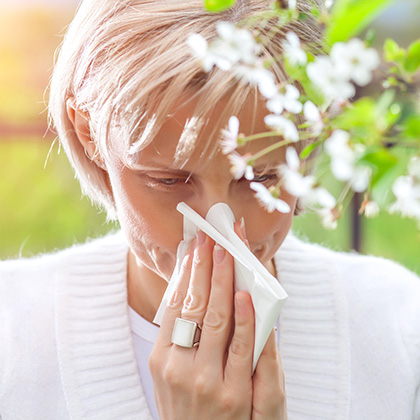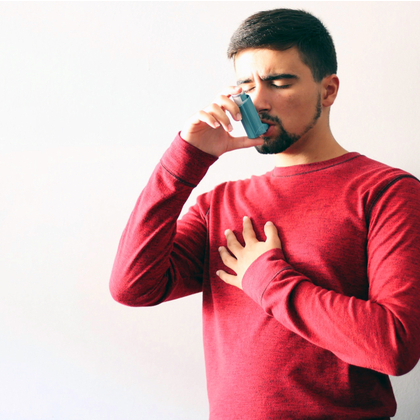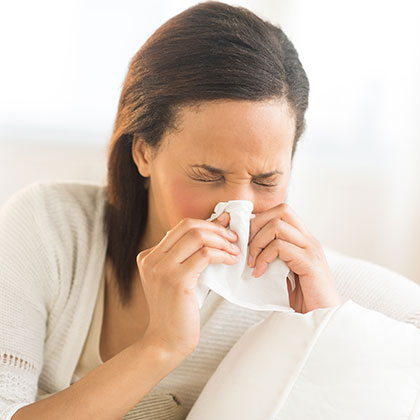
In early December 1952, cold weather, smoke from coal fires and a lack of wind combined to create one of the most severe air pollution episodes in UK history – an episode often referred to as the great smog of London.
This pea-souper to end all pea-soupers is thought to have contributed directly to at least 4,000 deaths (i), not to mention the many thousands of other people who became ill after breathing very poor-quality air. And in reaction to this unprecedented level of air pollution, the government of the time passed legislation to phase out coal fires.
Thankfully air pollution on this scale is a distant memory in this country. Yet it is still a serious risk to health, not just here in the UK but around the world. According to the World Health Organization (WHO), nine out of 10 people on this planet breathe air that contains high levels of pollutants, with an estimated seven million deaths caused each year by outdoor (ambient) and indoor air pollution (ii).
WHO data suggest the highest levels of outdoor air pollution are found in the Eastern Mediterranean region and in South-East Asia, where average annual levels are often more than five times higher than WHO limits (ii).
Meanwhile the lowest levels are, in general, found in high-income countries, including Europe, the Americas and the Western Pacific.
Despite this, Public Health England warns that poor air quality is the largest environmental risk to public health in the UK, with the cost to businesses and health services likely to exceed estimates of £8-20 billion (iii).
Indeed, a 2016 report by the Royal College of Physicians and Royal College of Paediatrics and Child Health suggests around 40,000 UK deaths are attributable to exposure to outdoor air pollution alone (iv).
What is air pollution?
Air pollution can be outdoor or indoor, with outdoor pollution caused by activities such as transport, industrial processes, farming and energy generation, and indoor pollution generated by household burning of fuel such as coal, wood or kerosene in open fires and in stoves.
The main components of air pollution that have known or suspected harmful effects on human health – as well as the environment – include the following:
Particulate matter
A mix of solid and liquid droplets of various sizes, shapes and compositions, particulate matter (PM) can be emitted directly or formed in the atmosphere through chemical reactions. It’s generated when fuel is burned, typically by vehicles, industry and in homes. But there are natural sources too, including soil, dust and even sea spray.
PM is classified according to its size, with coarse particles (PM10 - 2.5) the largest and ultrafine particles (PM0.1) the smallest. And the smaller they are, the greater the risk these particles pose to human health, since smaller particles can be drawn deeper into the lungs. According to Public Health England, there is also some evidence that ultrafine particles may pass through the lungs and into the bloodstream (iii).
Nitrogen dioxide
Abbreviated as NO2, this is a gas that’s mostly produced along with nitric oxide (NO) by road traffic, particularly vehicles fuelled by diesel (though it’s also produced by things like industrial processes, domestic heating and power generation). A report by the Committee on the Medical Effects of Air Pollutants claims NO2 is a respiratory irritant (v).
Sulphur dioxide
Produced by burning fossil fuels such as coal, sulphur dioxide (SO2) is an invisible gas that has an irritant effect on the lining of the nose, throat and airways (iii). Levels of SO2 are currently in decline, thanks to the fact that coal-burning has become less common during the past 50 years, with most SO2 now produced by industrial sources.
Ground-level ozone
Ozone (O3) is found in the earth’s upper atmosphere, but it can also be created at ground level when sunlight reacts with other pollutants, such as that emitted by road traffic. According to Public Health England, there is evidence to suggest short-term exposure to O3 may be associated with adverse effects on human health (iii).
Other components of air pollution include ammonia (NH3), carbon monoxide (CO) and non-methane volatile organic compounds (NMVOCs). Besides these, sources of indoor air pollution that are considered harmful to human health include tobacco smoke (including second-hand smoke) and radon, a naturally occurring radioactive gas that can accumulate in buildings.
Impacts on health
According to the WHO, outdoor air pollution is a major cause of death and disease globally, with health effects ranging from increased hospital admissions and A&E visits to increased risk of premature death. It claims an estimated 4.2 million premature deaths globally are linked to ambient air pollution (vi), and that indoor air pollution also causes an estimated 3.8 million deaths worldwide each year (vii).
Even if you live in the richest country on earth, there’s no escaping the negative effects of air pollution. Microscopic pollutants are in the air around us and can enter our bodies when we breathe. They can affect a number of different organs and systems, including:
-
Eyes, nose, throat
-
Lungs and respiratory system
-
Heart and blood vessels
According to Public Health England, the three main conditions associated with air pollution are respiratory conditions such as asthma, cardiovascular disease and lung cancer. There’s also emerging evidence that air pollution may be linked with dementia, low birth weight and type 2 diabetes (iii). The WHO, meanwhile, claims a third of deaths from stroke, lung cancer and heart disease are a result of air pollution, making air pollution on a par with smoking tobacco where damage to health is concerned (viii).
According to the Department for Environment Food & Rural Affairs (ix), here’s what some specific pollutants are known to do to different parts of the body:
Fine particles
These can be carried deep into the lungs where they can cause inflammation and a worsening of heart and lung diseases.
Nitrogen dioxide, sulphur dioxide, ozone
All three gases can irritate the airways of the lungs, and can produce worsening symptoms in people living with lung diseases.
Carbon monoxide
This prevents the uptake of oxygen by the blood, leading to significant reduction in the supply of oxygen to the heart – a particular problem for those who have heart disease.
Some people may be more affected by air pollution than others, sometimes because they have a health condition that air pollution can aggravate, or because they live or work in areas with a high level of air pollution (near busy roads, for instance). These include:
-
Children (each year more than half a million children around the world under the age of five die from respiratory disease linked to air pollution (viii)
-
Older people (as they’re more likely to experience heart and lung conditions than younger adults)
-
Pregnant women
-
People living with cardiovascular or respiratory disease
These groups and others who are sensitive to the effects of high air pollution can experience health problems even when the air pollution level is low. But those in the general population who aren’t at high risk can be affected too. Indeed, very high air pollution levels can cause problems such as a sore or dry throat, sore eyes and a tickly cough in the healthiest among us.
Making even a modest reduction in air pollution could, however, make a big difference. According to Public Health England (iii), reducing man-made air pollution by just one microgram per cubic meter of air (1µg/m3) over 18 years could prevent around…
50,900 cases of coronary heart disease
16,500 strokes
9,300 cases of asthma
4,200 lung cancers
How to protect yourself
In its advice for breathing better air, the Royal College of Physicians advises us to be aware of the air quality where we live (iv). One way to do this is to check the pollution forecast in your area at uk-air.defra.gov.uk/forecasting.
The air quality forecast is compiled by the Met Office and is based on five of the main pollutants that can affect health, namely ozone, nitrogen dioxide, sulphur dioxide, particulate matter PM2.5 and particulate matter PM10. New forecasts are produced each morning for the next five days and are available for 5,000 specific locations across the UK. The forecasts use the Daily Air Quality Index (DAQI), which measures air quality on a scale of 1 - 10. The index divides air quality levels into four bands:
Low (1 - 3)
Moderate (4 - 7)
High (8 - 9)
Very high (10)
Health advice is given for each band as follows:
Low
Enjoy your usual outdoor activities.
Moderate
Consider reducing strenuous physical activity, particularly outdoors, if you are an at-risk adult or child who experiences symptoms. Other individuals can enjoy their usual outdoor activities.
High
Those at risk should reduce strenuous physical exertion, particularly outdoors, and particularly if they experience symptoms. People with asthma may find they need to use their reliever inhaler more often. Older people should reduce physical exertion too. Anyone else who experiences discomfort such as sore eyes, cough or a sore throat should consider reducing activity, particularly outdoors.
Very high
At-risk individuals and older people should avoid any strenuous physical activity, while people with asthma may need to use their reliever inhaler more often. Those not in an at-risk group should also reduce physical exertion, particularly outdoors, if they experience symptoms such as a cough or sore throat.
Meanwhile, the WHO has the following advice on how to limit breathing polluted air (viii):
-
Avoid walking on busy streets during rush hour, and if you have a young child with you, try and lift them up above the level of vehicle exhausts.
-
Avoid spending time at specific traffic hotspots, such as cars stopped at traffic lights.
-
When you’re doing physical activity outdoors, try exercising in less polluted areas.
There are also things you can do to help reduce how much you contribute to air pollution. For instance, using public transport instead of your car can help reduce the number of cars on the road. Even using a petrol car rather than one fuelled by diesel can be helpful, especially in built-up areas where nitrogen dioxide levels are likely to be high.
Natural ways to relieve air pollution damage
It’s almost impossible to escape the effects of air pollution altogether here in the UK, even in the greenest and least populated areas. But there are a number of nutritional supplements that may help alleviate the damage air pollution does to your body
For instance, there is some evidence that taking fish oil supplements may have cardio-protective benefits where air pollution exposure is concerned.
In one small-scale study by scientists at the US Environment Protection Agency, a group of healthy middle-aged people were given either capsules of fish oil or olive oil for four weeks, then exposed to air pollution for a couple of hours.
Those taking olive oil experienced an increase in their blood cholesterol and triglyceride levels – but those taking the fish oils had no such changes, and also experienced lower levels of negative effects on heart functioning than the olive oil takers (x).
A review of studies into air pollution and nutrition has also found evidence to suggest a number of supplements may help protect against pollution damage that can trigger asthma, chronic obstructive pulmonary disease (COPD – another respiratory condition that can be aggravated by air pollution) and lung cancer initiation. These are vitamin D, vitamin E and substances called carotenoids (beta carotene is an example of a carotenoid) (xi). The same study also suggests vitamin C, curcumin (the active ingredient in turmeric), choline and omega-3 fatty acids may also be beneficial.
A separate study suggests a nutritional substance called N-acetylcysteine (NAC) may help protect the airways of the lungs against the effects of inhaling diesel exhaust fumes (xii). Elsewhere research has found that NAC supplementation may help prevent the symptoms of COPD from becoming worse, and that it may improve quality of life in people who are living with the condition (xiii).
Air pollution affects us all to a greater or lesser extent, no matter where we live. But this guide shows there are things you can do to keep your health as protected as possible. For more information on a wide range of health issues, visit our health library
References:
-
Available online: https://www.theguardian.com/theguardian/from-the-archive-blog/2012/dec/05/great-smog-london-1952-archive
-
Available online: https://www.who.int/news-room/detail/02-05-2018-9-out-of-10-people-worldwide-breathe-polluted-air-but-more-countries-are-taking-action
-
Available online: https://www.gov.uk/government/publications/health-matters-air-pollution/health-matters-air-pollution
-
Royal College of Physicians. Every breath we take: the lifelong impact of air pollution. Available online: https://www.rcplondon.ac.uk/projects/outputs/every-breath-we-take-lifelong-impact-air-pollution
-
Committee on the Medical Effects of Air Pollutants. Review of the UK Air Quality Index. Available online: https://assets.publishing.service.gov.uk/government/uploads/system/uploads/attachment_data/file/304633/COMEAP_review_of_the_uk_air_quality_index.pdf
-
Available online: https://www.who.int/airpollution/household/en/
-
Available online: https://www.who.int/news-room/spotlight/how-air-pollution-is-destroying-our-health
-
Available online: https://uk-air.defra.gov.uk/air-pollution/effects
-
Tong H. et al., Omega-3 Fatty Acid Supplementation Appears to Attenuate Particulate Air Pollution-Induced Cardiac Effects and Lipid Changes in Healthy Middle-Aged Adults. Environ Health Perspect. 2012 Jul;120(7):952-957. Available online: https://www.ncbi.nlm.nih.gov/pmc/articles/PMC3404661
-
Whyland T. et al., Pollution and respiratory disease: can diet or supplements help? A review. Respir Res. 2018;19:79. Available online: https://www.ncbi.nlm.nih.gov/pmc/articles/PMC5930792
-
Carlsten C. et al., Anti-oxidant N-acetylcysteine diminishes diesel exhaust-induced increased airway responsiveness in person with airway hyper-reactivity. Toxicol Sci. 2014 Jun;139(2):479-87. Available online: https://www.ncbi.nlm.nih.gov/pubmed/24814479
-
Fowdar K. et al., The effect of N-acetylcysteine on exacerbations of chronic obstructive pulmonary disease: A meta-analysis and systematic review. Heart Lung. 2017;46:120-128. Available online: https://www.ncbi.nlm.nih.gov/pubmed/28109565
-
Shen Y. et al., Effect of high/low dose N-acetylcysteine on chronic obstructive pulmonary disease: a systematic review and meta-analysis. COPD. 2014 Jun;11(3):351-8. Available online: https://pubmed.ncbi.nlm.nih.gov/24378052/
-
Salve. V.T., Atram. J.S. N-Acetylcysteine Combined with Home Based Physical Activity: Effect on Health Related Quality of Life in Stable COPD Patients- A Randomised Controlled Trial. J Clin Diagn Res. 2016. 10:OC16–OC19. Available online: https://www.ncbi.nlm.nih.gov/pmc/articles/PMC5296478
Related Posts
Disclaimer: The information presented by Nature's Best is for informational purposes only. It is based on scientific studies (human, animal, or in vitro), clinical experience, or traditional usage as cited in each article. The results reported may not necessarily occur in all individuals. Self-treatment is not recommended for life-threatening conditions that require medical treatment under a doctor's care. For many of the conditions discussed, treatment with prescription or over the counter medication is also available. Consult your doctor, practitioner, and/or pharmacist for any health problem and before using any supplements or before making any changes in prescribed medications.

Christine
Christine Morgan has been a freelance health and wellbeing journalist for almost 20 years, having written for numerous publications including the Daily Mirror, S Magazine, Top Sante, Healthy, Woman & Home, Zest, Allergy, Healthy Times and Pregnancy & Birth; she has also edited several titles such as Women’ Health, Shine’s Real Health & Beauty and All About Health.
View More



